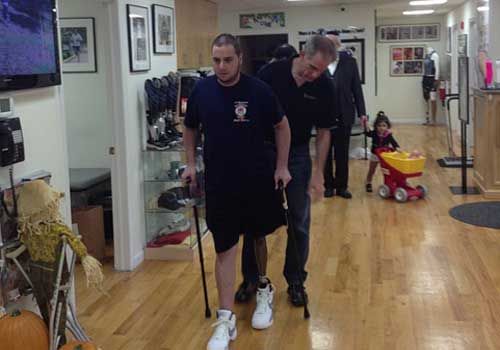“I wanted to get up off the couch, and my left knee basically gave out. I hit the floor.”
That’s the moment when 26-year-old First Lieutenant Ralph “Ralphie” Lettieri knew something was dangerously wrong.
Just a few weeks later, part of his left leg had to be removed. But as Lettieri embarks upon the slow and often painful road to recovery, he’s staying focused on a single goal — to get back on the firegound.
Freak occurrence
It all began in early July, Lettieri of the Hagerman Fire Department in East Patchogue, N.Y., scraped his left leg on some poison ivy, creating an open sore.
Soon after, he went scuba-diving in a freshwater quarry as part of a dive team training exercise.
It’s there that doctors believe he was infected with necrotizing fasciitis, or what’s more commonly known as “flesh-eating bacteria.”
“I never thought in my life, that that is what it could have been.” Lettieri said.
Doctors initially didn’t believe it either. They gave him antibiotics in hopes of stopping the infection, but it only got worse.
When the antibiotics didn’t work, Lettieri was brought to the emergency room, his infection still a mystery to doctors. Fluids were taken from his leg and sent for testing.
Before the results returned, he was put into a medically induced coma.
Going under
While in a coma, doctors started performing surgeries on Lettieri. After the first surgery, the test results came back and doctors realized what they were dealing with.
They performed six surgeries in total, removing most of his skin, to the point where they couldn’t take off any more of it. “From that point, there was nothing more the doctors could do,” Lettieri said.
The disease had progressed quickly from just a red bump on his left knee to a series of blisters and peeling skin that left his life in danger. The choice was clear — either let doctors take his leg, or they let the disease take his life.
Still in a coma, doctors amputated his left leg just above the knee on Aug. 11, about a month after getting infected.
Waking up
After four weeks in a coma, Lettieri finally woke up. It was in the middle of the night, and he had no idea that he had been battling necrotizing fasciitis for the past month, and had no idea part of his left leg was gone.
“You still have feeling, you know? Because the nerves are still there,” Lettieri said. “I was moving my right leg and I could feel the sheets moving, and I was moving my left leg, but I couldn’t feel the sheets on my foot. I lifted the covers, and I saw this bandage right where my knee would be ... then I realized, the leg was gone.”
He was still on a lot of medication and doesn’t remember much after that. He thinks he must have “freaked out,” because he remembers nurses coming into his room and injecting his IV with something to put him back to sleep.
He woke up the next morning with his parents by his side. They told him what had happened since his coma. For the next few days, Lettieri said he was in shock.
“I was in that state where I didn’t believe. I was like ‘Why? Why’d this happen to me?’”
Staying positive
It was only in those few days, however, that Lettieri said he felt down. Afterward, his resilience and trademark positive attitude would kick in.
He came to terms with the fact that losing his leg was his best option. Doctors said he was on the brink of death.
“If they didn’t take the leg, then it was my life. I just accepted it.” Lettieri said.
He credits two prior amputees speaking with him along with plenty of support from his fellow firefighters, family and friends with getting him through the ordeal.
“With their help, I was able to get my morale up and just deal with it, get through it.” Lettieri said.
To those who know him, they probably weren’t surprised to see how quickly Lettieri bounced back. According to him, he’s always been an optimist with a very positive attitude.
“It’s just the way I am. I just try to never let anything get to me. In the back of my head, I just thought ‘I’ll be normal again one day.’ There’s no reason to get down on myself,” he said.

Lettieri’s leg has his dept’s decal for their rescue truck, “The Junkyard Dog”
The passion
Lettieri said a lot of his positive nature comes from the firehouse. He takes a lot of what he learns and how he conducts himself there, into his personal life.
It only makes sense. He has been a firefighter for more than seven years, and he says it’s basically in his blood.
“Firefighting has been in my life, in my family since I was born,” he said.
His father was a fire chief in the early 1990s, exposing him to firefighting from a very early age. Just as he was finishing high school, he joined the department.
He says he’s learned a lot about himself from firefighting, especially his outlook on life.
“Being an officer in the fire department, it helps to just have that positive attitude, being good to everybody. You don’t want the morale of the department to go down. You got to keep everyone happy,” he said.
And he is vowing to return to his passion of firefighting as soon as possible.
Lettieri was fitted for a prosthetic leg and graduated from using crutches to canes on Nov. 16. He is currently going through rehab and says that he is starting to regain balance in his two legs again.

Lettieri works with his rehab specialist to walk with canes for the first time.
Returning to the firehouse
After getting comfortable with his first leg, Lettieri also plans to get a custom-built leg just for the firehouse, which will contain titanium, Kevlar and graphite.
He hopes that through rehab, he will be able to resume his firefighting duties just as he was before the infection. He knows it may be a long and difficult road, but he says he’s ready for the challenge.
“I want to push myself. I want to climb ladders, pull a hose, crawl. I just want to start from square one, like I was probie, and do it to make sure that I can do it, and just see what my limits will be,” he said.
And while Lettieri knows it will be a lot of hard work, he knows he must remain realistic.
“If I can do everything, then I’m going to go back as a full-fledged firefighter. And if I feel like I can’t do certain things, I might have to limit myself to being an exterior fireman. I don’t want that to happen, but if it has to be, it has to be. I’m just going to push myself in every way,” he said.
“I don’t want to quit. It’s one of those feelings you really can’t describe. It’s something you want to do and you really don’t want to give up on it, like you’ll do anything you have to to get it back — and that’s what I’m doing,” he said.
A collective effort
However hard the battle to rehabilitate and to get back to fighting fires may be, Lettieri can rest assured he won’t be doing it alone. The outpouring of support has astounded him.
“People I don’t even know, people from outside the state I got checks from. I had even gotten checks from people up in Canada. I didn’t even know who they were. It was amazing.” Lettieri said.
While in a coma, several restaurants and his fire department also held fundraisers to help cover his medical costs.
“Knowing that they care felt great.” he said.
Inspiring others
As devastating as it was to himself and his family, Lettieri thinks that good will come of it. He hopes that his story will inspire others to never give up and to strive for what they want out of life.
“I don’t want to say that if I can do it, anybody can do it. But, I really hope that people will be able to just sit there and read about it ... and it might make them just a little bit stronger to get through it,” he said. “I would hope that my story inspires people.”
He also hopes that his story will bring more attention to the disease that took his leg.
“It’s very rare. If my story can get people to look for a cure, or even just identify it, that’d be great,” he said.
According to the Center for Disease Control, necrotizing fasciitis infects about 15,000 people a year and researchers say that if left untreated can have a mortality rate of almost 75 percent.
Looking ahead
Many months of rehabilitation and relearning to walk are ahead for Lettieri. He says it had been a pretty smooth transition, learning to use crutches and a walker, and now he has moved on to learning to walk with a cane.
He complains of mild pain and tenderness where doctors folded over skin and stitched the site of his amputation, but he has been able to do most everything he did before the infection.
He is looking forward to his two new legs, one of which may have a computer chip built into the knee, to allow for more flexibility and mobility.
If everything goes as planned, Lettieri said he hopes to be back on the fireground in May.
For now, he has his fellow firefighters to rely on once he starts training again, who have stuck with Lettieri since the beginning.
“It’s the brotherhood. They’re always there by my side.”












